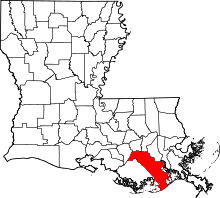Golden Meadow, Louisiana
| Town of Golden Meadow | |
| Town | |
| Country | United States |
|---|---|
| State | Louisiana |
| Parish | Lafourche |
| Elevation | 0 ft (0 m) |
| Coordinates | 29°23′17″N 90°16′10″W / 29.38806°N 90.26944°WCoordinates: 29°23′17″N 90°16′10″W / 29.38806°N 90.26944°W |
| Area | 2.9 sq mi (7.5 km2) |
| - land | 2.4 sq mi (6 km2) |
| - water | 0.5 sq mi (1 km2), 17.24% |
| Population | 2,193 (2000) |
| Density | 903.0 / sq mi (348.7 / km2) |
| Mayor | Joey Bouziga (elected 2012) |
| Timezone | CST (UTC-6) |
| - summer (DST) | CDT (UTC-5) |
| Area code | 985 |
|
Location of Golden Meadow in Louisiana
| |
 Location of Louisiana in the United States
| |
Golden Meadow is a town along Bayou Lafourche in Lafourche Parish, Louisiana, United States. The population was 2,193 at the 2000 census. It is part of the Houma–Bayou Cane–Thibodaux Metropolitan Statistical Area. Its main source of revenue is from property tax, sales tax, and from the oil and gas industry. The fishing and seafood industries also have strong economic impacts, with charter fishing, restaurants, and lodging actively serving patrons. The town was once known as a speed trap, but it has since been bypassed by Hwy 3235 and city traffic has been reduced to mostly locals. As in other places in Louisiana, there is a noticeable presence of Cajun culture, music, and cuisine.
The Golden Meadow name was given by the original land grant owners, Benjamin and Louisa Hobbs Barker of Illinois. In 1839, they named it so because of the yellow flowers growing everywhere. They hoped to get rich selling lots to French and English settlers but abandoned the plan.[1]
Geography
Golden Meadow is located at 29°23′17″N 90°16′10″W / 29.38806°N 90.26944°W (29.388192, -90.269457).[2]
According to the United States Census Bureau, the town has a total area of 2.9 square miles (7.5 km2), of which 2.4 square miles (6.2 km2) is land and 0.5 square miles (1.3 km2) (15.92%) is water.
Demographics
| Historical population | |||
|---|---|---|---|
| Census | Pop. | %± | |
| 1960 | 3,097 | — | |
| 1970 | 2,681 | −13.4% | |
| 1980 | 2,282 | −14.9% | |
| 1990 | 2,049 | −10.2% | |
| 2000 | 2,193 | 7.0% | |
| 2010 | 2,101 | −4.2% | |
| Est. 2014 | 2,076 | [3] | −1.2% |
As of the census[5] of 2000, there were 2,193 people, 821 households, and 583 families residing in the town. The population density was 903.0 people per square mile (348.4/km²). There were 934 housing units at an average density of 384.6 per square mile (148.4/km²). The racial makeup of the town was 92.52% White, 0.50% African American, 4.83% Native American, 0.41% Asian, 0.78% from other races, and 0.96% from two or more races. Hispanic or Latino of any race were 1.46% of the population.
There were 821 households, out of which 35.4% had children under the age of 18 living with them, 57.7% were married couples living together, 9.9% had a female householder with no husband present, and 28.9% were non-families. 22.8% of all households were made up of individuals and 11.9% had someone living alone who was 65 years of age or older. The average household size was 2.67 and the average family size was 3.16.
In the town, the population was spread out with 27.9% under the age of 18, 8.4% from 18 to 24, 29.4% from 25 to 44, 18.8% from 45 to 64, and 15.5% who were 65 years of age or older. The median age was 35 years. For every 100 females there were 95.1 males. For every 100 females age 18 and over, there were 93.8 males.
The median income for a household in the town was $28,690, and the median income for a family was $36,944. Males had a median income of $32,969 versus $21,786 for females. The per capita income for the town was $13,122. About 15.4% of families and 18.8% of the population were below the poverty line, including 19.9% of those under age 18 and 21.3% of those age 65 or over.
Notable person
- Dick Guidry, former member of the Louisiana House of Representatives from Lafourche Parish; graduated from Golden Meadow High School.
References
- ↑ Jambon, Ted. "Lower Bayou Lafourche Settlement: Where Did They All Come From". Roots Along The River, Le Baton Rouge, Vol XXC, No 3, Summer 2005, Baton Rouge Genealogical & Historical Society. p25-26.
- ↑ "US Gazetteer files: 2010, 2000, and 1990". United States Census Bureau. 2011-02-12. Retrieved 2011-04-23.
- ↑ "Annual Estimates of the Resident Population for Incorporated Places: April 1, 2010 to July 1, 2014". Retrieved June 4, 2015.
- ↑ "Census of Population and Housing". Census.gov. Retrieved June 4, 2015.
- ↑ "American FactFinder". United States Census Bureau. Retrieved 2008-01-31.
| |||||||||||||||||||||||||||||
